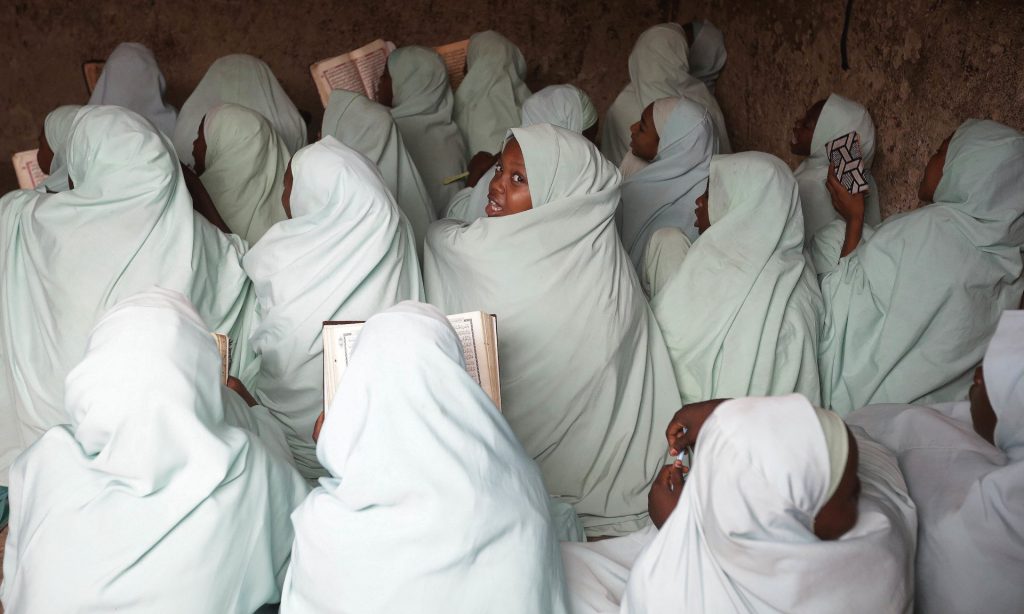
When 14-year-old Amina got married last year, the occasion was solemn. Rather than the flamboyance that often characterises Nigerian nuptials this was a subdued affair, attended only by a few family members and close friends.
The bride and groom knew each other, but they had not been in a relationship. Rather Amina, not her real name, was marrying one of three men who had gang-raped her in her village when she was 13 years old.
Usaini Ja’afar and his accomplices had confessed to the crime under interrogation by the Hisbah board, a religious police force responsible for the enforcement of Sharia law in the northern Nigerian state of Kano. He pleaded for forgiveness and offered to marry Amina so as to escape punishment.
Amina’s father agreed and the men were allowed to walk free.
“I decided to temper justice with mercy,” said Amina’s father, explaining his decision not to press charges against the men who assaulted his daughter. “I allowed him to marry the girl because our consultations with our Malams [Islamic clerics] showed that there is nothing wrong about that.”
Salahuddeen Armayau, who heads the Hisbah board, said the wedding had taken place last year, adding that the board had approved of the union because “the boy said he was willing to clear his mess, and even the victim’s father gave his blessing”.
The marriage, which has been condemned by human rights activists, is just one example of how rapists are escaping justice in northern Nigeria’s commercial capital. In a state where more than 100 cases of rape are reported each month, only a handful suspects are ever prosecuted.
Authorities say the majority of rape allegations are settled before they ever reach court. Sometimes the accused get off by asking respected members of the community to testify on their behalf; sometimes they offer the family money in return for dropping the charges; sometimes they marry their victims.
Even if charges are pressed, it can be hard to prosecute rape offences.
“Some of the victims are shy of speaking publicly about their ordeal in the hands of their rapists for fear of being stigmatised,” said Agafi Kunduli, a prominent Nigerian human rights activist.
“The police cannot prosecute without witnesses and this is one major reason why many rapists walk free.”
Police officers have even been accused of demanding bribes from women before arresting rape suspects.
“Some victims do not trust the police,” said an officer in Abuja who once worked in Kano. “We cannot blame them because even policemen are also involved in this,” he said, referring to the fact that a number of Kano police officers have themselves been accused of rape.
In 2014, a police officer and four others were arrested for allegedly gang-raping a 17-year- old at gunpoint. Last year, another officer was alleged to have raped a seven-year-old girl at police quarters in Kano. Neither officer has yet been prosecuted.
Even in the case of rape and murder, offenders often avoid jail sentences. Murder victims include a 22-year-old pregnant woman who died after being gang-raped in her home early this year, and a newlywed woman who was killed by at least one rapist in Sha’iskawa village, north of Kano state. No one has yet been prosecuted in either case.
Until last year, the maximum sentence for rape in Kano was two years, with the option of paying a fine instead. After an outcry, the government introduced a minimum sentence of 14 years life sentence in late 2015.
There is no crime of rape under Sharia law, which runs parallel to the criminal justice system in Kano, but having sex outside of marriage carries a sentence of death by stoning if the defendant is married or 100 lashes if they are not. In practice, however, the sentence is seldom enforced.
Women’s rights activists have called on authorities to do more to protect women and girls from sexual violence, and to ensure that rapists face justice. They say marriage should not be used as a way to escape justice.
“We just have to keep encouraging victims to speak,” said Kunduli. “No rapist should be allowed to go scot-free, even when he decides to marry the victim.”
Human rights lawyer, Eno Edet, said that the legal requirements to proving sexual assault needed rethinking, as they did not take into account the particular sensitivities involved in reporting rape.
“Law makers should sit down, speak to victims, and put themselves in their shoes,” said Edet, who has worked with a number of women who have been sexually assaulted. “The police should take their work seriously because rape changes lives.”
